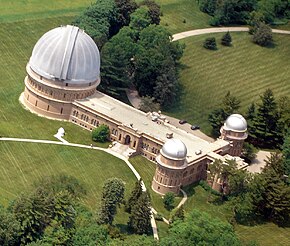
Back مرصد يركس ARZ Еркская абсерваторыя Byelorussian Еркская абсэрваторыя BE-X-OLD Observatori Yerkes Catalan Yerkesova observatoř Czech Yerkes-Observatorium German Αστεροσκοπείο Γιερκς Greek Observatorio Yerkes Spanish Yerkesi observatoorium Estonian رصدخانه یرکیز Persian
 | |||||||||||||||
| Alternative names | 754 YE | ||||||||||||||
|---|---|---|---|---|---|---|---|---|---|---|---|---|---|---|---|
| Named after | Charles Yerkes | ||||||||||||||
| Observatory code | 754 | ||||||||||||||
| Location | Williams Bay, Walworth County, Wisconsin | ||||||||||||||
| Coordinates | 42°34′13″N 88°33′24″W / 42.5703°N 88.5567°W | ||||||||||||||
| Altitude | 334 m (1,096 ft) | ||||||||||||||
| Established | 1892[1] | ||||||||||||||
| Website | yerkesobservatory.org | ||||||||||||||
| Telescopes | |||||||||||||||
| |||||||||||||||
| | |||||||||||||||


Yerkes Observatory (/ˈjɜːrkiːz/ YUR-keez) is an astronomical observatory located in Williams Bay, Wisconsin, United States. The observatory was operated by the University of Chicago Department of Astronomy and Astrophysics[2][3] from its founding in 1897 until 2018. Ownership was transferred to the non-profit Yerkes Future Foundation (YFF) in May 2020, which began millions of dollars of restoration and renovation of the historic building and grounds. Yerkes re-opened for public tours and programming in May, 2022.[4] The April, 2024 issue of National Geographic magazine (both print and online) featured a story about the Observatory and ongoing work to restore it to relevance for astronomy, public science engagement and exploring big ideas through art, science, culture and landscape. The observatory offers tickets to programs and tours on its website.
The observatory, often called "the birthplace of modern astrophysics," was founded in 1892 by astronomer George Ellery Hale and financed by businessman Charles T. Yerkes. It represented a shift in the thinking about observatories, from their being mere housing for telescopes and observers, to the early-20th-century concept of observation equipment integrated with laboratory space for physics and chemistry analysis.
The observatory's main dome houses a 40 in-diameter (102 cm) doublet lens refracting telescope, the second-largest refractor ever successfully used for astronomy. The largest lens is the Swedish 1-m Solar Telescope. There are several smaller telescopes – some permanently mounted – that are primarily used for educational purposes. The observatory also holds a collection of over 170,000 photographic plates.[5]
The Yerkes 40-inch was the largest refracting-type telescope in the world when it was dedicated in 1897. During this time, there were many questions about the merits of the various materials used to construct and design telescopes. Another large telescope of this period was the Great Melbourne Telescope, which was a reflector. In the United States, the Lick refractor had just a few years earlier come online in 1888 in California with a 91 cm lens.
Prior to its installation, the telescope on its enormous German equatorial mount was shown at the World's Columbian Exhibition in Chicago during the time the observatory was under construction.
The observatory was a center for serious astronomical research for more than 100 years. By the 21st century, however, the historic telescope had reached the end of its research life. The University of Chicago closed the observatory in October 2018. In November 2019, it was announced that the university would transfer Yerkes Observatory to the non-profit Yerkes Future Foundation (YFF). The transfer of ownership took place on May 1, 2020.[6] The community-based foundation hired a director and launched a $25M campaign to restore the observatory and the fifty acres of historic Olmsted-designed grounds. By 2024 the foundation had already raised some $21million towards its goal, and extended the goal to $40million. The mission of Yerkes is to "...advance humankind's understanding of the universe and our place within it, igniting curiosity, facilitating exploration, and nurturing a deep sense of connection with our environment, our planet and each other."[7] The foundation has taken steps to transform the observatory and its grounds into a unique public site for astronomy and discovery, hosting researchers and graduate students in astronomy, offering public talks and programs, tours and education programs. In 2023 Yerkes opened four newly-built miles of walking trails and installed the first commissioned outdoor sculpture by artist Ashley Zelinskie. Yerkes has hosted talks, programs or residencies with Grammy-winning musicians and composers Eighth Blackbird, Brooklyn-based artist Ashley Zelinskie, former US Poet Laureate Tracy K Smith, astronomer and public educator Dean Regas, and former Senior Scientist of the James Webb Space Telescope and Nobel prizewinner Dr. John Mather. Major restoration work has been ongoing and will continue for many years ahead. Since the observatory re-opened to the public in summer 2022 for tours and programs, more than 50,000 ticketed visitors have taken tours or attended events, with tens of thousands more enjoying the open-access landscape.
- ^ Hale, George E. (1896). "Yerkes Observatory University of Chicago, Bulletin No. I." The Astrophysical Journal. 3: 215. Bibcode:1896ApJ.....3..215H. doi:10.1086/140199.
- ^ "Yerkes Observatory – Home". Archived from the original on March 17, 2011. Retrieved April 20, 2003.
- ^ "The Department of Astronomy and Astrophysics: A Bit of History". astro.uchicago.edu. Archived from the original on September 9, 2015. Retrieved June 16, 2019.
- ^ "About Yerkes Observatory". www.yerkesobservatory.org. Archived from the original on January 21, 2021. Retrieved February 8, 2021.
- ^ "Observatory website". Archived from the original on May 14, 2011.
- ^ Carynski, Connor (May 1, 2020). "Foundation celebrates donation and takes ownership of Yerkes Observatory". lakegenevanews.net. Archived from the original on May 2, 2020. Retrieved June 9, 2010.
- ^ url=http:www.yerkesobservatory.org}}
© MMXXIII Rich X Search. We shall prevail. All rights reserved. Rich X Search
